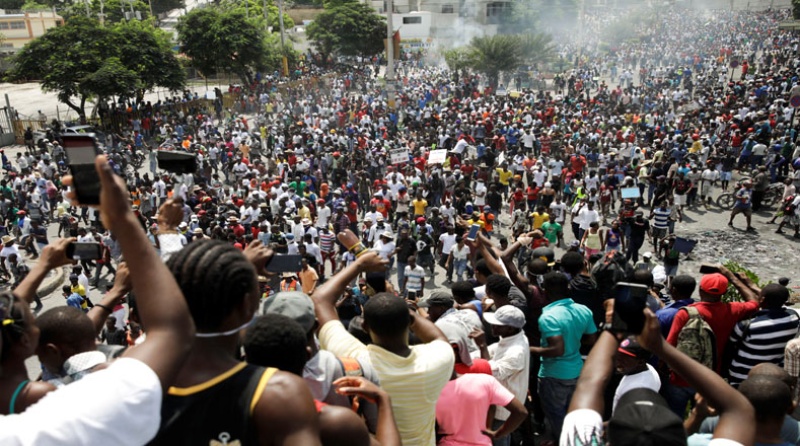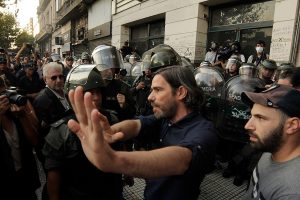This year the protest movement in Haiti against President Jovenel Moïse’s administration reemerged as a result of his attempt to extend his term. The ongoing political and social crisis of recent years has been heightened by the pandemic. The IMF’s chokehold on the country exacerbated the already desperate situation of thousands of people living in poverty. This led to the first demonstrations against the increase in fuel prices that shook Moïse’s government in 2018, resulting in the resignation of several ministers.
We discussed the situation in Haiti with Lautaro Rivara, a sociologist and journalist and a former brigade member of the international peasants’ movement La Via Campesina. He is in Haiti and is able to provide first-hand information on the current situation.
First of all, can you tell us what has been happening in Haiti in the past few days?
What’s happening in the country could be summarized as the consolidation of a coup perpetrated by the former constitutional president, Jovenel Moïse, and his ultra neoliberal and ultra conservative party, the PHTK. He had already taken an authoritarian turn in previous years by refusing to hold elections that were scheduled to take place. This led to a direct confrontation with part of the opposition in the Haitian parliament. He also closed the parliament, which stopped operating last January, and there has been a confrontation with various Haitian courts, which have been silenced or limited by executive orders.
There is currently no institutional counterweight to Jovenel Moïse’s de facto government. And now he aims to reform the constitution to provide constitutional protection to a series of measures that his administration has taken by executive order since the beginning of this year. This has led to an increase in social and political opposition, which is not new in the country. At least 3 years ago there were massive, continuous street demonstrations demanding Jovenel Moïse’s resignation. The situation has only worsened and the government’s loss of legitimacy has led to more repressive policies put in place by executive order, which the government calls “anti-terrorist” policies, leading to increased repression not only by state and police forces, but also by paramilitary forces.
You mentioned that the people of Haiti have been protesting against the government continuously for three years. What are the root causes of the conflict?
First of all, it’s important to consider the continuous interference of various Western powers. There was a long period of French re-colonization after the Revolution came to an end in 1804, followed by US interference throughout the 20th century with the country’s occupation in 1915, which lasted several decades, in addition to the tutelage of different multilateral organizations like the OAS and the United Nations, among others.
As in other countries in the region, the current causes of the unrest are the devastating effects of the neoliberal policies put in place in Haiti, which have led the country to a situation of extreme poverty and inequality. In the past few years, the protests have been caused by the government’s authoritarian rule and its policy of repressing the social and political opposition. The most recent protests have taken place because the president has decided to remain in office despite the fact that his term ended on February 7 of this year. There was a dispute regarding the interpretation of Haiti’s constitution, but the Higher Council of the judiciary was clear in establishing that Moïse’s term has expired and demanded that he step down. Today, there is an ongoing debate on the legitimacy of Moïse’s government.
In the media, we see mass protests along dirt roads in run-down neighborhoods, which leads to the question of the social situation in Haiti. Can you tell us about that?
The social situation is complex. Haiti is commonly known as the poorest and most unequal country in the entire hemisphere. And if you look at the social indicators, they have only worsened in recent years, particularly under Moïse’s government. We’re talking about a youth unemployment rate of up to 70%, and higher levels of extreme poverty. There are structural problems, like foreign interference, which have led to increased hunger. In recent years, Haiti has suffered the consequences of the continuous depreciation of its currency, the gourde, with respect to the US dollar, along with inflation levels that have increased to about 20%. This is occurring in a social context in which the margin for the reproduction of life is so slim, that it has a devastating impact.
Since 2018, the people have been protesting because of the economic situation. What effects has this had on the government?
Since July 2018, there have been mass mobilizations that have eroded the legitimacy of the Moïse’s government. It’s important to remember that he came to power after two consecutive fraudulent elections that were supported by the international community and the United States. There have also been a series of other factors, like the attempt to eliminate fuel subsidies, which would have resulted in a 50% increase in gasoline and kerosene prices. This would have had a significant impact, considering that many Haitian families use kerosene to light lamps in their homes. This measure was a “suggestion” of the IMF, which should actually be understood as a demand, along the lines of the policies it was pushing for in other countries. The rejection of this policy was immediate and overwhelming, leading to a mass insurrection, with about 2 million people on the streets [in a country of 11 million], forcing the government to backtrack.
Another issue that has led to widespread opposition to Moïse’s government was a corruption scandal of historic proportions linked to 3.8 billion dollars that were provided to the country for the Petrocaribe energy platform. A big portion of those resources was illegally appropriated by the Haitian ruling class and, according to a report from the Parliament and another from the High Court of Accounts, by Moïse himself through all the companies he owns. So one of the demands of Haiti’s social movement is transparency regarding the misappropriation of those public funds and that the people responsible be punished.
What sectors of Haitian society are participating in the protests?
There is a wide range of social sectors that are united behind this minimal demand that Moïse step down and that a transitional government be put in place to organize transparent elections, after making significant political and electoral reforms. This broad alliance includes sectors of the most traditional and conservative political class, as well as progressive and radical social movements from the countryside and the city. There are different coalitions of political groups and parties, the most progressive of which is the Patriotic Forum, which brings together the main peasant movements, unions and some religious sectors.
There is a peasant movement that has been under attack, but which is well structured and continues to be the main organizing force in the mass movement, particularly the Kat Je organization. Women also play a central leading role, especially in feminist groups in urban areas. There are women’s committees in most movements.
There is also a labor movement organized in the maquilas. It’s very small in class terms, but it’s quite radical. The opposition also includes professional organizations from the country’s small middle class, including teachers, doctors, etc.
There are people from all kinds of social sectors in the protests. Even the religious sector plays a relevant role. There are Catholics, Evangelicals and voodoo practitioners. Religion is political, like everywhere else. Here it can play progressive and even revolutionary roles. There is also a very conservative Neo-Pentecostal evangelical sector.
The other relevant sector, and the most massive, is the urban youth of the peripheries. Their organizations are weaker and more spontaneous, but they have been the heart and bulk of the protests in recent years.
Why hasn’t Moïse’s government fallen yet?
Considering how broad the coalition against the government is, including business sectors, business associations and the main churches in the country, like the Catholic Church and evangelical sectors, the fact that Moïse has remained in power can only be explained by the international support he’s received, primarily from the US embassy, the Organization of American States (OAS) and the United Nations. Without this support, which has been completely decisive in the country’s history in cutting short or extending presidential terms, it’s clear that Moïse would not be in power today.
There is also a tacit but obvious agreement on the part of the United States, by which Moïse will be granted total immunity once his term ends. Historically, this has generally involved the US government granting visas to these servile leaders and their families and the promise of a comfortable life somewhere in the United States.
In a recent article in Nodal you mentioned the imperialist support and interventions on the island. How are northern countries responsible and what links do they have with the ruling class in Haiti? What specific interests do they have in the island?
People often question the idea of rich countries having an interest in Haiti, saying that it’s such a poor country that they wouldn’t have much to gain by exploiting it. This is a fallacy. Haiti has enormous mineral wealth concentrated in the northern region. There are huge US and Canadian corporations that are currently extracting those resources or have plans to extract them in the future. These resources include gold, copper, silver and bauxite. It’s also important to mention that Haiti’s large diaspora continuously sends resources to the island and there is a group of mostly financial companies that controls the flow and appropriates the surpluses of these resources, and those companies are also mostly from North America.
There is another important factor, which has to do with the fact that Haiti and other Caribbean countries are conceived as major recipients of North American products, particularly from the agricultural sector. There has been a clear lack of food sovereignty here since the IMF and the United States promoted Haiti’s financial and commercial deregulation in the 1980s and all of the country’s customs fees were reduced to almost zero. This is linked to the deep crisis in Haiti’s agricultural economy, as a result of which the country is now forced to import basic food products that it used to produce for itself in sufficient quantities. There are also a series of geopolitical interests involved in the control of a Caribbean territory that is just a few miles from strategic sites like the Panama Canal, the island of Cuba or the Bolivarian Republic of Venezuela.
Who is in the political opposition?
The Haitian ruling class is of course completely tied to the interests of the United States. It is a rather peculiar and fundamentally parasitic ruling class, which in general does not produce wealth of any kind, but reproduces itself as a class through the appropriation of surpluses from the country’s customs system. So for this particular Haitian elite, which, to a large extent, does not even live in the country, it is convenient for the country not to produce anything at all, so that everything has to be imported.
What role did Latin American governments, both progressive and conservative, play in the MINUSTAH (United Nations Stabilization Mission in Haiti)?
The MINUSTAH, which is well-known for having been involved in numerous scandals, crimes and cases of sexual abuse, having triggered a cholera epidemic and perpetrated numerous massacres in several low-income neighborhoods, has come to an end. It was followed by a two-year mission known as MINUJUSTH, which has also ended. We now have BINUH, a mission which, unlike the previous ones, only includes civilians. It doesn’t include any police or military forces. This doesn’t mean, however, that the threat of re-militarization and re-occupation is not constantly hanging over the Haitian people’s heads like a kind of sword of Damocles when political situations like these get out of hand. Of course, this mission has clearly been set up with an aim of political interference.
As for the role of progressive governments, it is a well-known fact that many of them were part of the MINUSTAH, including the ones in Chile, Argentina and Uruguay. It’s extremely important to carry out an in-depth assessment of the benefits, crimes and civil and political responsibilities involved. It’s important to remember that not all governments in the region were responsible. There were two very honorable exceptions, those of Venezuela and Cuba, which decided to establish a different kind of relationship with Haiti and provide a different type of aid, which didn’t involve sending in military troops, but collaborating in social policies, for example, and in the field of medicine. This has been really very important to the country. Today, the Haitian people’s perception and opinion of Venezuela and Cuba are very positive and they are bound to these countries by strong ties and profound gratitude.
First published in Spanish on March 3 in La Izquierda Diario.
Translated by Marisela Trevin











